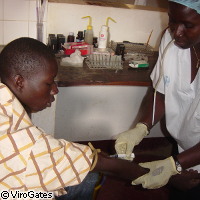Simple blood test could save lives
EU-funded scientists have demonstrated that a simple blood test can predict which patients are at greatest risk of dying and so should be kept in hospital for further tests and treatment. The researchers hope that the test will eventually be used routinely in all hospitals. The findings, published in the journal Tropical Diseases and International Health, are a result of the TREATBEST ('Establishing a TB treatment efficiency marker') project, which was financed through the EU's Sixth Framework Programme (FP6). The project brings together Danish biotech company ViroGates and the Bandim Health Project in Guinea Bissau, west Africa. The aim of the project is to investigate ways of monitoring the efficacy of tuberculosis (TB) treatments. The suPARnostic blood test was developed by ViroGates. It measures the levels of a protein called suPAR (soluble urokinase Plasminogen Activator Receptor); these levels can be measured in blood, serum, plasma and urine. Earlier studies have suggested that people with high levels of suPAR are at a greater risk of dying than those with lower suPAR levels. The study looked at over 1,600 patients at the Bandim Health Project who were suffering from TB-like symptoms. Just over 1,000 tested negative for TB and were sent home after having their suPAR levels tested. Three months later, health workers visited these patients at home to see what had become of them. In the intervening period, 51 of the patients had died. An analysis of the data revealed that the mortality level of those with the highest suPAR levels stood at 16%. The mortality level for the rest of the patients was just 1%. 'One of the great challenges in the treatment of acute patients is to identify those who are developing a life-threatening disease,' said Torben Mogensen, Medical Director of Copenhagen University Hospital Hvidovre in Denmark. 'Once identified, appropriate treatment can be initiated and the negative development hopefully stopped. 'These new data confirm previous promising observations at our hospital, and we now wish to examine this test further by including it as part of the routine blood analysis on patients with acute illness at Hvidovre Hospital.' Dr Mogensen's colleagues in Guinea Bissau are similarly enthusiastic about the new test. 'We have identified a simple tool, the suPARnostic assay, that identifies diseased individuals who, despite a negative TB diagnosis, have high risk of mortality,' commented Paulo Rabna of the National AIDS Secretariat in Guinea Bissau. 'We now aim at implementing this test in the routine screening of diseased individuals seeking hospital treatment. Individuals with a high suPARnostic test [result] will now go through accelerated diagnostic and clinical examination, followed by an appropriate treatment programme to reduce the high risk of mortality.' Betina Macho, CEO of ViroGates, added: 'This newest study demonstrates how a simple blood test can save lives, in this case when patients are discharged from the hospital with unnoticed illnesses. We expect that suPARnostic will eventually be implemented in all hospitals for routine use - to help increase many patients' chances.' Guinea Bissau has extremely high levels of TB, with around 470 cases for every 100,000 adults. On a global scale, a third of the world's population is infected with TB and there are over 8 million new cases every year, mostly in developing countries. As well as working on clinical tests to evaluate the efficacy of TB treatments, the TREATBEST project has a strong focus on education and capacity building in Guinea Bissau. This will help local doctors and laboratory technicians standardise the way they collect and analyse both data and samples.
Countries
Denmark, Guinea-Bissau



